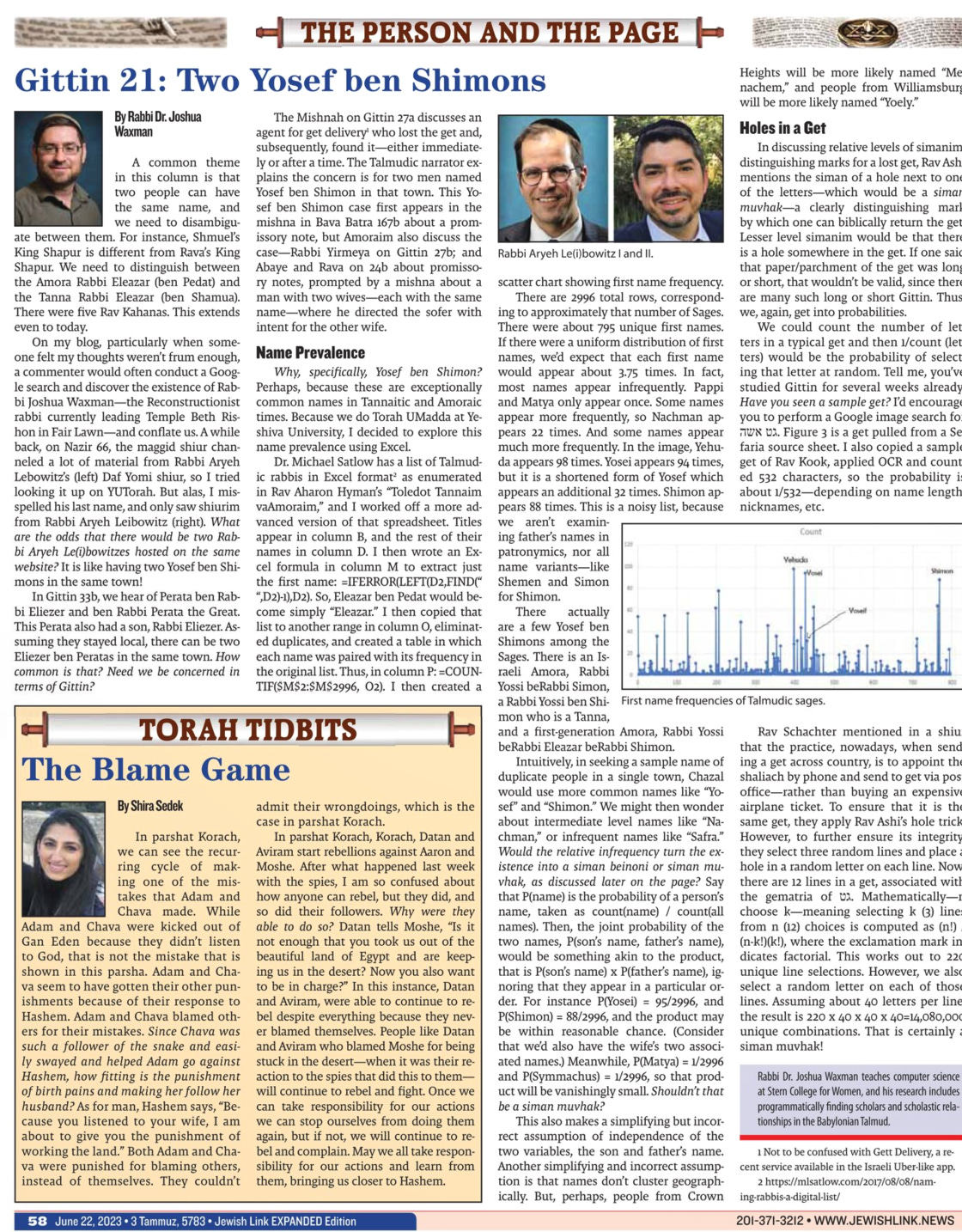Two Yosef ben Shimons (article summary)
A while back, when we were studying Gittin 21, I wrote about a topic from today’s daf, the possibility of having two people named Yosef ben Shimon in the same town. I will link to it / summarize it below.
Before this, just one quick thought on today’s daf, Bava Metzia 18a-b:
דְּאִי לָא תֵּימָא הָכִי, קַשְׁיָא דְּרַבָּה אַדְּרַבָּה. דְּהָהוּא גִּיטָּא דְּאִשְׁתְּכַח בֵּי דִינָא דְּרַב הוּנָא, דַּהֲוָה כְּתִוב בֵּיהּ בִּשְׁוִירֵי מָתָא דְּעַל רָכִיס נַהֲרָא. אָמַר רַב הוּנָא:
As, if you do not say so, that this concern is taken into account only in a place where it is known that there are two people with this same name, then there is a difficulty presented in the form of a contradiction between this statement of Rabba and another statement of Rabba. As there was a certain bill of divorce that was found in the court of Rav Huna, in which it was written that the bill of divorce was written in Sheviri City, which is located on the Rakhis River. Rav Huna said about this:
חָיְישִׁינַן לִשְׁנֵי שְׁוִירֵי, וַאֲמַר לֵיהּ רַב חִסְדָּא לְרַבָּה: פּוֹק עַיֵּין בָּהּ, דִּלְאוּרְתָּא בָּעֵי מִינָּךְ רַב הוּנָא. נְפַק, דַּק וְאַשְׁכַּח. דִּתְנַן: כׇּל מַעֲשֵׂה בֵּית דִּין – הֲרֵי זֶה יַחֲזִיר.
We are concerned about the possibility that there are two cities named Sheviri and that this bill of divorce may belong to someone else who lives in the other Sheviri, and therefore it should not be returned. And Rav Ḥisda said to Rabba about this issue: Go out and examine this halakha, as in the evening Rav Huna will ask you about it. He went out, examined it, and discovered a relevant source, as we learned in a mishna (20a): One must return any court enactment, i.e., a promissory note that has been authenticated by the court, to its owner. Since the bill of divorce was found in the court, it is in this category and must be returned.
Earlier (and a bit later), we were discussing caravans, בִּמְקוֹם שֶׁהַשְּׁיָירוֹת מְצוּיוֹת. Perhaps Sheviri means Caravans, as the city name. Caravans traveled circuitously along the river rather than directly through the desert, because of access to water, so this was on the river of Rachis. So, perhaps there were other such cities. Would they all be on the same river? (The way the gemara interprets the story, this city wasn’t particularly about caravans, just being in Rav Huna’s court was equivalent to where caravans are present.)
Anyway, the article is this (paid Substack, Jewish Link HTML, flipdocs):
Here is a brief summary of the longer article.
We often encounter in the gemara two people with the same name, including with a title and / or a patronymic. For instance, Rabbi Eliezer, Rav Kahana, and even Rabban Shimon ben Gamliel. Hey, look, on YUTorah, there are two people named Rabbi Aryeh Le(i)bowitz!
Places in tractate Gittin where we are concerned about people with the same name, e.g. one man married two women with the same name and wrote a get to one of them.
I wonder if Yosef and Shimon were chosen arbitrarily, or for a reason. In fact, Yosef / Yossi and Shimon / Simon / Shimi are among the most common names of Tannaim and Amoraim, either their names or their fathers’ names. I quantify this in Excel.
What about intermediate names? What about exceptionally rare names?
In Gittin and in Bava Metzia, Rav Ashi mentions that we can identify the lost get even it was lost for a while if there is a siman muvhak, a strong sign such as a hole next to one of the letters.
If note that if this were done randomly, it is about a 1 / 532 chance. Nowadays, the practice is three randomly selected different lines, and on each line, a randomly selected letter. I compute the probability of that, as 1 / 14,080,000. See there for how we figure this out.




